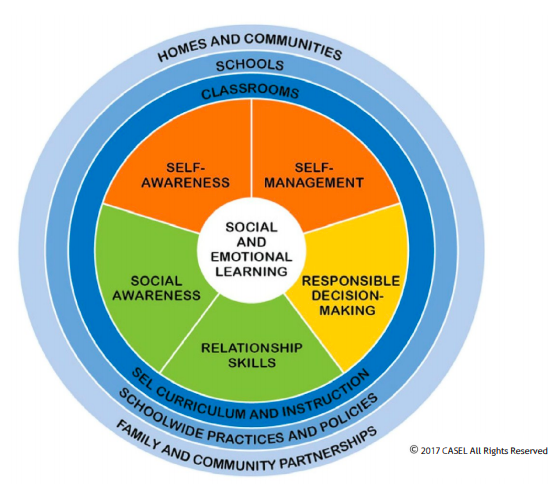The Collaborative for Academic, Social, and Emotional Learning (CASEL) outlines the five SEL competencies that are foundational for child development at home and in the classroom. Implementing social emotional learning in the classroom, greatly enhances “students’ capacity to integrate skills, attitudes, and behaviors to deal effectively and ethically with daily tasks and challenges” (CASEL 2019).
Wisdom: The World of Emotions engages CASEL’s five competencies to help students strengthen social emotional skills. As a result, educators will see an increase in positive attitudes as well as the confidence to achieve academic success and the ability to build stronger social relationships. Presented below are the different ways in which the five competencies are embodied in Wisdom:
1. Self-awareness
The ability to identify one’s own emotions and their effect on behavior, and the ability to recognize one’s strengths and weaknesses. When playing Wisdom’s interactive games:
Students learn to identify emotions through facial expressions, body language, and tone of voice
Students learn emotions are generally triggered by a stimulus (thought, event) which they can learn to identify
Students are empowered to feel confident about identifying their emotions and capabilities to understand them
Self-awareness is an important aspect of a student’s ability to be successful in school. The ability to identify one’s emotions will make a difference in how a students assesses the effect of that emotion on their behavior.
Self-awareness includes a student’s sense of self-confidence and recognizing one’s own strengths and areas for improvement.
2. Self-Management
The ability to regulate emotions and behaviors, manage stress and the ability to set and achieve goals. Through Wisdom’s Augmented Reality mindful breathing exercises and meditations:
Students develop coping skills to manage difficult emotions and discover tools that work best for regulating anger, fear, and anxiety.
Students learn about ways they can reconnect with something positive after managing difficult emotions.
When students are able to regulate their emotions in school, they can effectively manage stress and control impulsive behavior.
Having a sense of self means students can be self-motivated for achieving academic and personal goals.
3. Social Awareness
The ability to take the perspective of and empathize with others, including those from diverse backgrounds and cultures and to understand social and ethical norms. Social awareness is fostered by Wisdom’s interactive games:
Students learn to recognize emotions in themselves and others, and because they also know what it’s like to experience those emotions they can empathize with others.
Students learn how to solve conflicts by having a different perspective.
Students learn to recognize their parents and teachers as a system of support when dealing with difficult emotions.
Schools are most often a child’s first experience in a social setting. This is where children will learn to share the perspective of other students, appreciate diversity, and learn to emphasize with others. Children learn to respect others, including their teachers and peers.
4. Relationship Skills
The ability to establish healthy relationships, communicate clearly, listen and work well with others, and seek help when needed. With Wisdom’s community building and getting-to-know-you activities:
Students practice listening skills with their peers and better understand how they can help each other.
Students more easily engage in teamwork activities to help build communication and active listening skills.
In addition to learning how to be respectful and empathetic of others, students build positive relationships in school with their teachers and peers.
5. Responsible Decision-Making
The ability to make constructive choices, and evaluate outcomes and consequences of actions. Through Wisdom’s interactive games about conflict resolution and role-playing activities:
Students learn how to take perspective and resolve conflicts based on the 4 steps of nonviolent communication.
Students learn how to differentiate between needs and wants. By distinguishing between the two, students can make responsible choices about their personal behavior.
Students will reflect on the difference between their wants and the wants of others.
Teachers, principals and administrators set the tone for the mission of the school and the values they wish for their students to embody. These often include the ability to make ethically responsible decisions. Students learn to identify and solve problems based on the standards set by the school.
Life-Long Lessons
When I first started teaching Pre-K I knew developing social emotional skills would be important. Many of my students excelled academically with what they needed to know to be prepared for Kindergarten. However, I noticed there was a significant need for social emotional learning. I now use social emotional learning to help my students understand their emotions, learn the best ways to manage them, practice active listening skills, and learn how to problem solve. After having these kinds of conversations or engaging in activities to support them I noticed my students were more communicative and empathetic with each other. When I first started using Wisdom in my classroom I knew we were making even bigger steps towards strengthening those skills. Not only will my students carry with them to Kindergarten the academic lessons they’ve learned but they will also carry the social emotional learning lessons for years to come.



